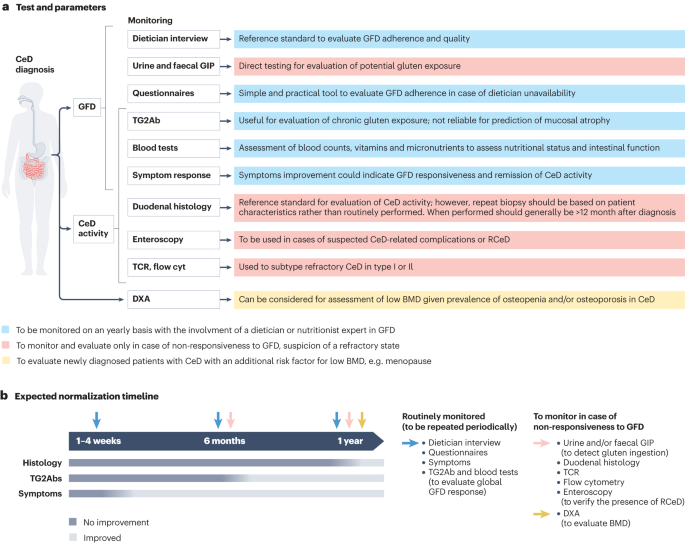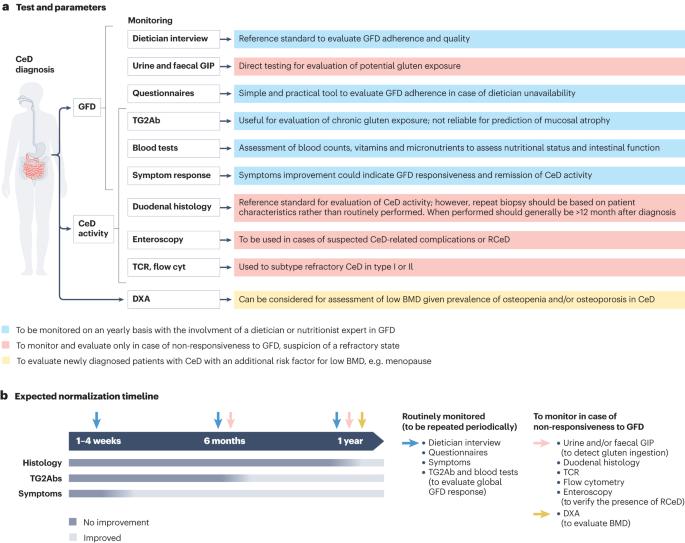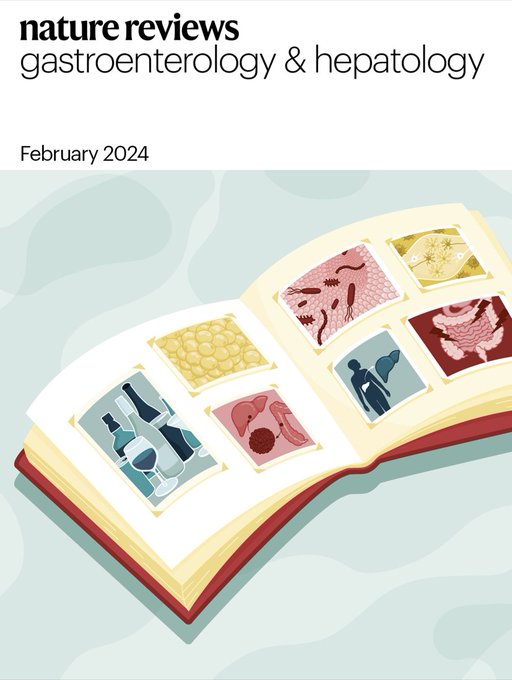Guidelines for best practices in monitoring established coeliac disease in adult patients
IF 45.9
1区 医学
Q1 GASTROENTEROLOGY & HEPATOLOGY
引用次数: 0
Abstract
Coeliac disease (CeD) is an immunological disease triggered by the consumption of gluten contained in food in individuals with a genetic predisposition. Diagnosis is based on the presence of small bowel mucosal atrophy and circulating autoantibodies (anti-type 2 transglutaminase antibodies). After diagnosis, patients follow a strict, life-long gluten-free diet. Although the criteria for diagnosis of this disease are well defined, the monitoring phase has been studied less and there is a lack of specific guidelines for this phase. To develop a set of clinical guidelines for CeD monitoring, we followed the Grading of Recommendations Assessment, Development and Evaluation methodology. Statements and recommendations with the level of evidence were developed and approved by the working group, which comprised gastroenterologists, pathologists, dieticians and biostatisticians. The proposed guidelines, endorsed by the North American and European coeliac disease scientific societies, make recommendations for best practices in monitoring patients with CeD based on the available evidence. The evidence level is low for many topics, suggesting that further research in specific aspects of CeD would be valuable. In conclusion, the present guidelines support clinicians in improving CeD treatment and follow-up and highlight novel issues that should be considered in future studies. Coeliac disease is a chronic inflammatory disease triggered by gluten consumption in individuals with a genetic susceptibility. These Evidence-Based Guidelines provide recommendations for improving the health care of the patients and discuss future perspectives.


监测成年患者已确诊的乳糜泻最佳实践指南
乳糜泻(Celiac disease,CeD)是一种免疫性疾病,由具有遗传倾向的个体食用食物中的麸质引发。诊断依据是小肠粘膜萎缩和循环自身抗体(抗 2 型转谷氨酰胺酶抗体)。确诊后,患者要严格遵守终身无麸质饮食。虽然这种疾病的诊断标准已经明确,但对监测阶段的研究较少,也缺乏针对这一阶段的具体指南。为了制定一套 CeD 监测临床指南,我们采用了建议分级评估、发展和评价方法。由胃肠病学家、病理学家、营养学家和生物统计学家组成的工作组制定并批准了具有证据等级的声明和建议。拟议的指南得到了北美和欧洲乳糜泻科学协会的认可,根据现有证据提出了监测乳糜泻患者的最佳实践建议。许多主题的证据水平较低,这表明对 CeD 的特定方面开展进一步研究将很有价值。总之,本指南支持临床医生改进 CeD 治疗和随访,并强调了未来研究中应考虑的新问题。
本文章由计算机程序翻译,如有差异,请以英文原文为准。
求助全文
约1分钟内获得全文
求助全文
来源期刊
CiteScore
52.30
自引率
0.60%
发文量
147
审稿时长
6-12 weeks
期刊介绍:
Nature Reviews Gastroenterology & Hepatology aims to serve as the leading resource for Reviews and commentaries within the scientific and medical communities it caters to. The journal strives to maintain authority, accessibility, and clarity in its published articles, which are complemented by easily understandable figures, tables, and other display items. Dedicated to providing exceptional service to authors, referees, and readers, the editorial team works diligently to maximize the usefulness and impact of each publication.
The journal encompasses a wide range of content types, including Research Highlights, News & Views, Comments, Reviews, Perspectives, and Consensus Statements, all pertinent to gastroenterologists and hepatologists. With its broad scope, Nature Reviews Gastroenterology & Hepatology ensures that its articles reach a diverse audience, aiming for the widest possible dissemination of valuable information.
Nature Reviews Gastroenterology & Hepatology is part of the Nature Reviews portfolio of journals.

 求助内容:
求助内容: 应助结果提醒方式:
应助结果提醒方式:


